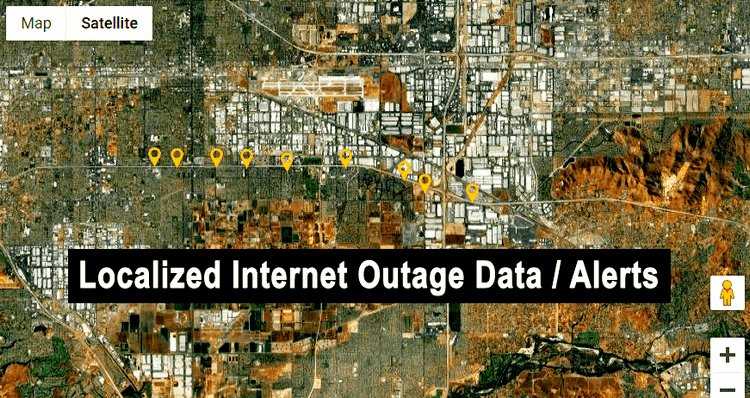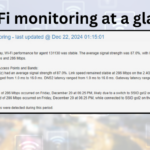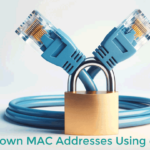Adding independently observed Internet outage monitoring could greatly improve a company’s ability to not only prevent extended downtime but even pre-empt potential problems. Monitoring Internet problems from each location can provide a number of benefits over centralized monitoring.
One key advantage is that it can allow for a more granular and localized view of Internet outages and problems.
When Internet outages or other issues are monitored from a centralized location, it can be more difficult to get a clear picture of what is happening on the ground. This is because the data being collected is aggregated from a wide range of sources, and it may not be possible to discern exactly where the problems are occurring or how they are affecting specific areas.
On the other hand, monitoring Internet problems from each location allows for a much more detailed and specific view of what is happening. By collecting data directly from each location, it is possible to get a much clearer picture of the exact nature of the problem and how it is impacting that specific area.
This can be especially important in cases where the issue is limited to a particular region or neighborhood, as it can help to identify the root cause and take more targeted action to resolve the problem.
Another benefit of monitoring Internet problems from each location is that it can help to ensure that outages and other issues are addressed more quickly and efficiently. When problems are detected from a centralized location, it can take longer to identify the source of the issue and dispatch technicians or other personnel to resolve it.
By contrast, when issues are detected at the local level, it is often possible to take action more quickly, which can help to minimize the impact of the outage and reduce downtime.
Another advantage of monitoring Internet problems from each location is that it can help to improve the overall reliability of the Internet. By identifying and addressing issues at the local level, it is possible to prevent small problems from turning into larger outages that can affect a larger area.
This can help to ensure that the Internet is more stable and reliable overall, which can be especially important for businesses and other organizations that rely on the Internet to function. From an ISP’s point of view, it could help pre-empt problems or provide information that customers might not be able to.
Monitoring data can often recognize when aggregate switches or interfaces are starting to fail and could be replaced before completely failing.
Monitoring Internet problems from each location can be more cost-effective and provide an additional level of detail over centralized monitoring. The low cost of adding our monitoring alongside existing monitoring is quickly offset by saving support time or even a single unneeded truck roll.
Having the ability to see what the customer is experiencing without their having to try to explain can give you a huge advantage, allowing you to build customer trust and loyalty.
Our monitoring data provides information on potential problems and facilitates a quicker and more efficient resolution of issues. It helps improve overall Internet reliability to ensure the stability of Internet services at customer locations, equipment rooms, remote field cabinets and sensors, security, and generally anything Internet-connected.
Legal implications of Internet outages
The legal implications of Internet outages can be complex and varied, depending on the specific circumstances of the outage and the parties involved. In some cases, Internet outages may be caused by technical issues that are beyond the control of any one party, such as equipment failures or natural disasters. In these cases, there may not be any legal consequences.
However, in other cases, Internet outages may be caused by the actions or inactions of one or more parties. In these cases, there may be legal consequences for those parties, depending on the specific circumstances and the laws that apply.
One key legal issue that may arise in the context of Internet outages is finger pointing, or the assigning of blame to one or more parties. When an Internet outage occurs, it is often difficult to determine immediately what caused the problem. This can lead to a situation where different parties point fingers at each other, alleging that the other party is responsible for the outage.
Resolving these disputes can be complex, as it often requires an investigation to determine the root cause of the outage. This may involve gathering and analyzing technical data and other evidence, such as logs, network diagrams, and other records. In some cases, it may be necessary to bring in experts to help analyze the data and identify the cause of the outage.
Rogers cable in Canada got into such a situation some time back as did Frontier communications over slower speeds than were being sold.
Another legal issue that may arise in the context of Internet outages is the issue of damages. If an Internet outage is caused by the actions or inactions of one or more parties, those parties may be liable for any damages that result from the outage. These damages can include lost revenue, lost productivity, and other costs that are incurred as a result of the outage.
In order to recover damages in these cases, it will typically be necessary to prove that the outage was caused by the actions or inactions of the other party and that the damages resulted from the outage. This can be a complex and time-consuming process, as it may involve gathering and presenting evidence to support the claim.
The legal implications of Internet outages may also depend on the specific laws and regulations that apply. Different countries and regions have their own laws and regulations that govern the use and operation of the Internet, and these laws may have different provisions related to Internet outages and liability.
It is important to consider these laws and regulations when determining the legal implications of an Internet outage.
The legal implications of Internet outages can be complex and varied, depending on the specific circumstances of the outage and the parties involved.
Finger-pointing and the issue of damages are two key legal issues that may arise in the context of Internet outages, and it may be necessary to conduct an investigation and gather evidence in order to resolve these issues.
The specific laws and regulations that apply may also have an impact on the legal implications of an Internet outage.
The importance of independently observed Internet outages
The importance of Internet outages cannot be understated in today’s interconnected world. With so much of our daily lives and business operations reliant on the Internet, any interruption to service can have far-reaching consequences.
One of the primary reasons why Internet outages are important is that they can significantly disrupt communication. For individuals, this can mean being unable to stay in touch with friends and loved ones through social media or messaging apps. For businesses, it can mean being unable to communicate with clients or colleagues, leading to lost productivity and potentially even lost revenue.
Internet outages can also have serious implications for public safety. In the event of an emergency, the Internet is often used to coordinate response efforts and disseminate critical information to the public. If the Internet is down, it can be much more difficult for first responders and other emergency personnel to communicate and coordinate their efforts, potentially leading to a delay in response and an increase in the severity of the situation.
In addition to the direct consequences of Internet outages, there are also indirect impacts to consider. For example, an Internet outage at a major online retailer could lead to lost sales and revenue, not only for the retailer itself but also for the companies that supply them with goods and services. This ripple effect can have a far-reaching impact on the economy as a whole.
There are also security implications to consider when it comes to Internet outages. In the event of a cyber-attack or other malicious activity, an Internet outage could be used to cover the tracks of the perpetrators. This can make it much more difficult to identify the source of the attack and take appropriate action to prevent similar incidents in the future.
Finally, Internet outages can be frustrating and inconvenient for users. When we rely so heavily on the Internet for everything from entertainment to getting work done, an outage can be a significant inconvenience. This can lead to a negative impact on customer satisfaction and loyalty, especially for businesses that rely on the Internet to provide their products or services.
Overall, Internet outages are a significant concern because of the many ways in which they can disrupt our daily lives and business operations. By monitoring outages and working to prevent and mitigate them, we can help ensure that the Internet remains a reliable and integral part of our modern world.
How our services can help
We help consumers, small business, MSP’s, ISP’s, and other IT organizations by automatically documenting internet outages and service disruptions with historical data. It provides a more granular and localized view of internet issues over centralized monitoring, allowing users to understand exactly where problems are occurring, which providers are involved, and how they impacted specific areas.
The data we provide is available whether or not providers and network operators willingly divulge the information, and it can be used by employers, remote employees, TeleHealth providers, security services, and anyone who would benefit from gaining insight into internet service performance or receiving quick alerts to problems.
One key legal aspect that could arise in the context of Internet outages is finger-pointing, or the assigning of blame to one or more parties. When an Internet outage occurs, it is often difficult to determine immediately what caused the problem. This can lead to a situation where different parties blame each other, alleging that the other party is responsible for the outage.
By collecting data directly from each location, it is possible to take quicker and more targeted action to resolve problems, which can help minimize downtime and improve the overall reliability of the internet. Finger-pointing and potential lawsuits are no longer an issue as the data will show when, where, and with whom problems were.
Monitoring data can also recognize when switches or interfaces may be starting to fail, allowing for preventative action to be taken before a complete failure occurs. This can help prevent small problems from turning into larger outages that affect a wider area.
While network operators may feel they already have similar functions, our solution is purpose-built to lower the costs of internet problems, working perfectly stand-alone or with existing monitoring. This can help to ensure that internet services are stable and reliable at customer locations, equipment rooms, and remote field cabinets.
From the perspective of an ISP, monitoring internet problems from each location can be especially beneficial in building customer trust and loyalty. By seeing what the customer is experiencing and addressing issues quickly and efficiently, ISPs can improve overall internet reliability and stability.
Know about problems before the calls start coming in. The low cost of adding OutagesIO or MSP Sensors is quickly offset by saving support time or even a single unneeded truck roll.
Reach out and find out if OutagesIO or MSP Sensors is a good fit for your organization.









